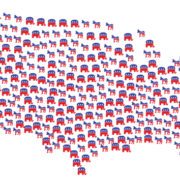FOR the last decade, it’s been known that Asian American and Pacific Islander (AAPI) voters comprise the fastest growing electorate in the United States.
However, a recent study shows that AAPI voters are still largely ignored by political parties and organizations, rendering the diverse community underrepresented when it comes to policy decisions.
The Asian American Voter Survey — which was released on Monday, July 25 by a coalition of AAPI-focused organizations — observed current political attitudes and voting behaviors among Asian American voters at a time whenthe spotlight is pointed at the collective civic AAPI identity.
The survey’s main takeaway is that even though more than two-thirds of AAPI registered voters are planning to vote in the upcoming midterm election, less than half have been contacted by the major parties.
What’s more is that 52% of Asian Americans said they haven’t been contacted by the Democratic Party while 60% haven’t been contacted by the Republican Party. Among Filipinos who surveyed, 52% said that the Democratic Party hadn’t reached out to them and 57% said that the Republican Party hasn’t reached out to them.
“Asian American communities, despite the progress we have made and increasing political power, are still being ignored by many politicians, to their detriment,” said Christine Chen, director of APIAVote.
Among the “extremely important” issues among these subjects included health care, education, economy, public safety, and gun control.
Notably, Filipinos were the largest group who considered health care (66%) an extremely important issue when deciding who and what to vote for.
“Many people, including candidates, think about Asian Americans as very single-dimensional or dual-dimension, but they don’t think about these complexities and how to really appeal to the broader Asian American agenda,” Janelle Wong, co-director of AAPI Data, said in a press briefing.
Following the trends shown in past surveys, the majority of the subjects of this survey support Democratic or left-leaning lawmakers and politicians. As a whole, 56% of Asian Americans consider themselves more left-leaning.
However, Filipinos in the survey had the second-largest share of self-identified Republican or conservative voters, with 32% identifying as such. Likewise, 54% of Filipinos surveyed reported leaning more toward Democratic ideology.
About 54% said they would vote for Democrats in congressional races and a majority agreed with generally liberal ideals: a more streamlined citizenship system, stricter gun laws, opposing bans on books and critical race theory, to name a few.
Notably, 73% of Asian Americans today worry about hate crimes and harassment, which is likely due to the uptick in anti-Asian hate incidents over the last two-and-a-half years.
The survey was conducted in June 2022 and consisted of 1,601 voters of Chinese, Filipino, Indian, Japanese, Korean, and Vietnamese descent. This survey’s main limitation is the makeup of its subjects as the Asian diaspora in America comprises of dozens more broad ethnic groups.
However, this survey is only one of a few dedicated to the Asian American voting bloc, and the researchers are confident that more disaggregated data will lead to more race and ethicity-inclusive policies and attitudes among seats of power.
Jiny Kim, vice president of policy and programs at Asian Americans Advancing Justice, said in a statement, “Asian Americans are part of a diverse community comprising over 50 different ethnicities and 100 different languages, so it is critical that we conduct this survey every two years because often we are either left out of the polling data or considered an afterthought in the numbers that get reported.” (Klarize Medenilla/AJPress)







